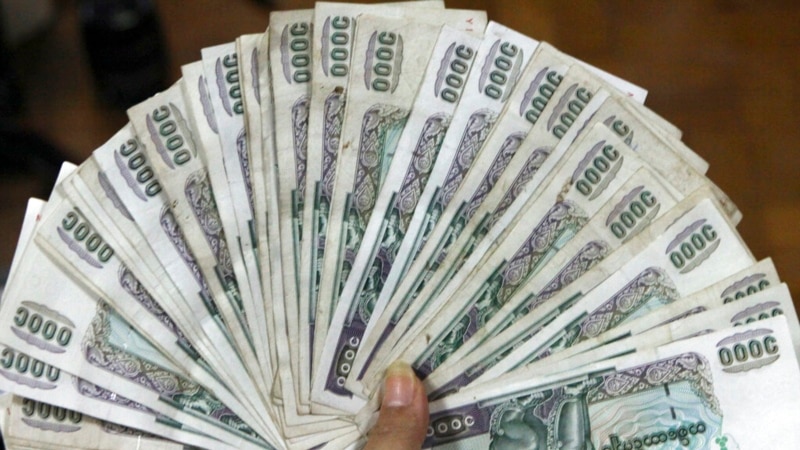
Reports of counterfeit banknotes circulating in Myanmar have skyrocketed in recent weeks amid the junta’s mismanagement of the economy, but experts say the military regime is ill-equipped to address the problem because officials “only know how to give orders” but not implement them. Since February, a growing number of posts have appeared on social media allegedly documenting fake high-denomination bills involved in public cash transactions, while offers for counterfeit kyats are commonly advertised online or papered on walls at bus terminals in cities and towns across the country. Earlier this week, Facebook user “Rose Angle” posted a video in which he complained about a growing number of fake kyats and provided a demonstration of how the dye could be washed off one he claimed to have obtained simply by holding it under a running faucet. The post received several responses by users who included photos of what they claimed were counterfeit bills they had received in cash transactions. RFA’s Myanmar Service spoke with sources in the business and banking communities, as well as other members of the public, who said they had personally dealt with fake currency and described the problem as increasingly severe. A salesperson based in the seat of Bago region’s Pyay township told RFA that he was recently made to cover his company’s loss after he accepted counterfeit banknotes in one cash transaction. “We didn’t realize it at first, but when we brought the notes to the bank, they determined that some of them were counterfeits,” he said, speaking on condition of anonymity. “When such fake notes are discovered, we must pay from our own pockets and it’s not easy to do that when there are two or three 10,000-kyat counterfeit notes. It hurts a lot. Thirty thousand kyats [$17] is a lot for us.” The salesperson said a similar incident occurred in mid-February and that he had discovered counterfeit currency twice that month. He now regularly examines the watermarks and thickness of all bills during cash transactions but noted that spotting fakes is difficult for average people who lack the tools to detect them. Soe Tun, a businessman in the commercial capital Yangon, told RFA he had been forced to obtain a counterfeit bill detector because of the increase in fake bills in circulation. “We have to be very careful these days as counterfeits are now more common than ever before,” he said, suggesting the problem had worsened since the junta seized power in a Feb. 1, 2021, coup, sending the economy into a freefall. “For money changers, there are machines to detect these counterfeit notes, but they aren’t accessible to ordinary people. Otherwise, your best option is to deal with payments through bank accounts, particularly if there is a large amount of money involved.” Other sources noted a proliferation of advertisements in recent weeks offering 1 million kyats [$560] worth of counterfeit bills for as little as 100,000 kyats [$56], which they said had exacerbated the problem. Investigation under way Aung Kyaw Than, the junta’s director general of the Central Bank’s financial management department, told RFA that efforts are being made to crack down on the sale of counterfeit notes online. But he said that reports of such services are overblown. “These are likely rumors, as I haven’t seen such sales being made,” he said, adding that the junta’s Ministry of Home Affairs “is investigating the matter to take proper action.” Junta Deputy Information Minister Zaw Min Tun outright dismissed concerns over the reports of counterfeiting. “We have discovered some counterfeit notes, but it wasn’t a lot,” he said, adding that the fakes “were not of high quality.” “We’re also watching what's happening on social media and trying to find out the source of the reports. We have found that [offers of counterfeit bills] weren’t being acted on. I just want to say that there’s no need to worry about this problem.” The junta comments follow media reports citing an official announcement in January which said a police raid on counterfeit bill producers in Karen state’s Myawaddy township had nabbed more than 1,700 fake 10,000-kyat denomination bills along with uncut sheets of paper used to print currency. Economist Zaw Pe Win said the problem will continue if the junta fails to put systematic controls in place. “The problem with the military is that it only knows how to give orders, but it offers no systematic or technical policy for how to implement them. The junta just tries to fix problems however it sees fit,” he said. “If the military doesn’t change that approach, things won’t get any better. Criminals will produce counterfeits, if given a chance, and they will be distributed to the public. Unless the junta can find an effective way to stop this, the situation will become worse.” Zaw Pe Win said that the junta’s violent repression of anti-coup protests had destroyed investor confidence in Myanmar and the resulting economic turmoil, but ordinary people are the ones suffering the consequences. He said the military must normalize foreign trade relations and provide stability if it hopes to repair the economy but has so far been unable or unwilling to do so. Meanwhile, the proliferation of counterfeit notes has only added to the anxiety of a population already grappling with a rapidly depreciating kyat, rising commodity prices, and worsening food shortages in the wake of the coup.
Most Read